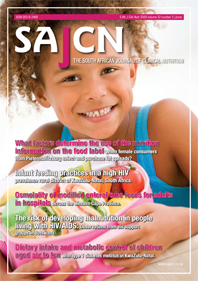Infant Feeding Practices in a High HIV Prevalence Rural District of KwaZulu-Natal, South Africa
Keywords:
infant feeding practices, exclusive breastfeeding, mixed feeding, HIV
Abstract
Aim: To describe infant feeding practices at birth and at 14 weeks post-partum in the Ugu-North Health District, KwaZulu-Natal, South Africa. Methods: A prospective, cohort study design was used. Mothers who delivered over a one-month period were interviewed at birth and 14 weeks later. Results: Initially, 168 mothers were interviewed within 24 hours of delivery, of whom 117 (70%) were contactable at 14 weeks post-partum. The vast majority (96%) initiated breast-feeding at birth. At birth, less than one-third (55/168 [32.7%]) of mothers declared an intention to both breast and formula (mix) feed in the next 14 weeks, but by the 14th week post-partum over three-quarters (89/117 [76.1%]) actually practised mixed feeding. At 14 weeks, the prevalence of exclusive breast-feeding was 18%: 52% of infants were offered water and 73% solids. The majority (20/23 [87%]) of HIV infected mothers chose to breastfeed their infants at birth. Nevertheless, they were significantly more likely to formula feed their infants compared to HIV negative mothers (3/23 [13.0%] vs 2/145 [1.4%], OR 10.73, 95% CI 1.34 – 99.16, p = 0.02). By 14 weeks, only 11% of HIV positive mothers were still exclusively breast-feeding, while almost two-thirds (12/19 [63%]) practised mixed feeding. This change was mainly ascribed to their need to return to school (40%) or to work (20%). Conclusions: Most infants were fed inappropriately by 14 weeks of age. The failure to maintain exclusive breast-feeding, despite high initiation rates, is of greatest concern. Routine prevention of mother-to-child transmission of HIV services was ineffective in influencing mothers to follow any feeding regimen exclusively.
Published
2009-04-03
How to Cite
Ghuman, M., Saloojee, H., & Morris, G. (2009). Infant Feeding Practices in a High HIV Prevalence Rural District of KwaZulu-Natal, South Africa. South African Journal of Clinical Nutrition, 22(2), 74. Retrieved from http://sajcn.co.za/index.php/SAJCN/article/view/265
Issue
Section
Original Research
Material submitted for publication in the South African Journal of Clinical Nutrition (SAJCN) is accepted provided it has not been published elsewhere. Copyright forms will be sent with acknowledgement of receipt and the SAJCN reserves copyright of the material published.
The SAJCN does not hold itself responsible for statements made by the authors.


